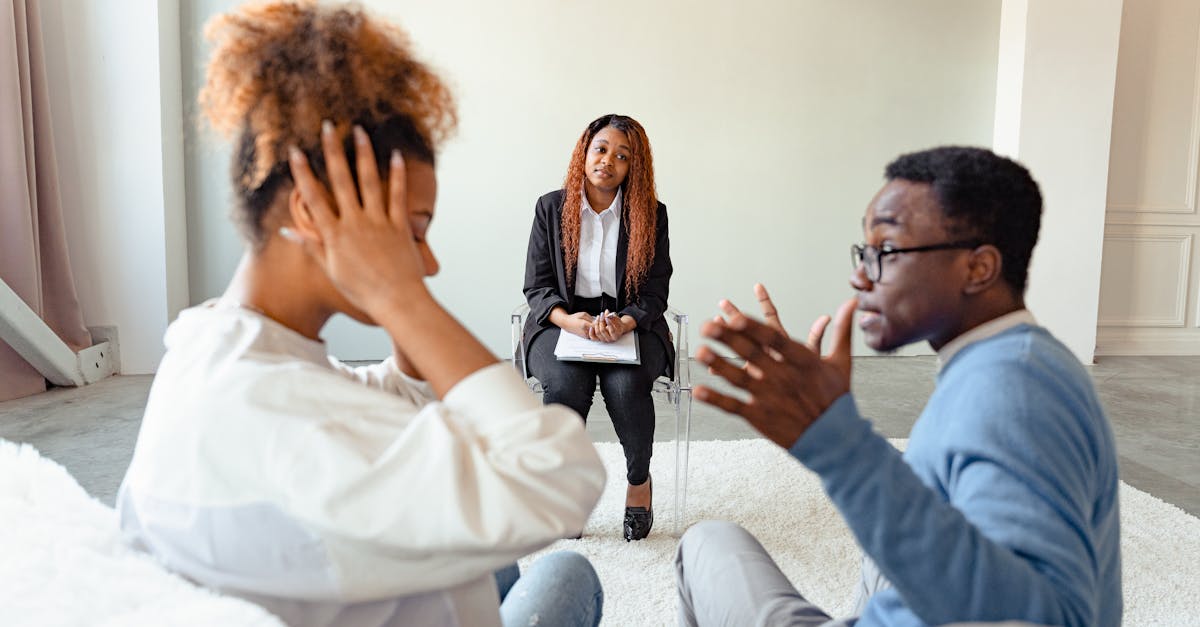
Different Approaches to Couples Counselling
Couples Counseling employs a variety of methods tailored to meet the unique needs of each partnership. One common approach is Emotionally Focused Therapy (EFT), which emphasizes understanding and reshaping emotional responses between partners. This method aims to foster secure attachment and enhance emotional bonds, enabling couples to navigate conflict with greater empathy. Another effective option is Cognitive Behavioral Therapy (CBT), which focuses on identifying negative thought patterns and behaviors within the relationship. By addressing these aspects, couples can develop healthier communication techniques and problem-solving skills.
Another notable approach is the Gottman Method, founded on extensive research about what makes relationships succeed or fail. This method involves assessing the relationship through conversation, helping partners recognize strengths and areas of concern. Incorporating tools such as the 'Love Map', it encourages couples to build deeper intimacy and a better understanding of each other. Each of these techniques provides a structured path for couples seeking guidance, ensuring that therapy sessions are productive and centered on achieving meaningful progress.
Overview of Therapy Methods
Couples counseling encompasses various approaches tailored to address the unique dynamics of each relationship. Common methods include Emotionally Focused Therapy (EFT), which emphasizes emotional connection, and Cognitive Behavioral Therapy (CBT), which focuses on changing negative patterns of interaction. These therapies aim to help couples improve communication, resolve conflicts, and strengthen their bond through structured sessions led by trained professionals.
Additionally, some therapists utilize the Imago Relationship Therapy approach, which encourages partners to understand each other's childhood experiences and how these influence current behaviors. Narrative therapy is another method, allowing couples to reframe their relationship stories and create healthier narratives. Each of these therapy methods provides tools and strategies for couples counseling, offering pathways to foster a deeper understanding and lasting change within the relationship.
When to Seek Couples Counselling
Couples Counseling can be beneficial in various situations where relationship dynamics become strained. Partners may notice recurring conflicts or persistent communication breakdowns. Other signs include feelings of disconnection, lack of intimacy, or unresolved past issues resurfacing. Seeking professional help at this stage can provide an essential framework for understanding each other and redefining relationship goals.
It's also important to consider Couples Counseling when life changes significantly impact the partnership. Factors such as job loss, relocation, or the arrival of a new family member can create stress and alter relationship dynamics. Recognizing the need for external support can prevent minor issues from escalating into more significant problems, fostering healthier interactions and emotional resilience.
Signs That Indicate Need for Help
Couples often experience challenges that can significantly impact their relationship. Signs of ongoing conflict, communication breakdowns, or a persistent feeling of dissatisfaction may indicate a need for help. If partners find themselves engaging in frequent arguments or struggling to resolve issues, these may be warning signals that should not be ignored. When emotional distance or resentment begins to overshadow positive interactions, seeking Couples Counseling can provide valuable support.
Another indication that it's time to seek assistance lies in the emotional health of both partners. Feelings of loneliness, depression, or anxiety can manifest within a relationship, affecting not only individual well-being but also the dynamics between partners. If either person feels trapped or powerless in the relationship, Couples Counseling may offer a path to clarity and healing. Identifying these signs early can help prevent further deterioration of the relationship and encourage proactive steps toward resolution.
The Role of the Therapist
The therapist plays a crucial role in couples counseling, acting as a facilitator for communication between partners. They create a safe space for both individuals to express their feelings, thoughts, and concerns without fear of judgment. By guiding the conversation, therapists help couples identify underlying issues that may not be immediately apparent. This exploration can lead to a deeper understanding of each partner's perspective and emotions.
In addition to fostering communication, the therapist employs various skills and techniques tailored to the couple's unique dynamics. These may include conflict resolution strategies, active listening exercises, and cognitive-behavioral approaches aimed at changing negative thought patterns. The therapist's expertise contributes significantly to helping couples navigate their challenges, encouraging healthier interactions and promoting reconciliation.
Skills and Techniques Used
Therapists utilize a variety of skills and techniques in couples counseling to address the unique dynamics of each relationship. Active listening plays a crucial role in understanding the perspectives of both partners. This technique helps create a safe space for open communication while allowing the therapist to identify underlying issues. Additionally, role-playing exercises can encourage empathy, as partners explore each other’s thoughts and feelings in a structured way.
Another effective technique is the use of cognitive-behavioral strategies to reframe negative thoughts and patterns of interaction. By guiding couples to recognize and challenge harmful assumptions, therapists help them develop healthier communication habits. Furthermore, mindfulness practices may be incorporated to enhance emotional regulation and promote a greater sense of connection. These approaches aim to empower couples, equipping them with the tools needed for lasting change.
FAQS
What is the typical success rate of couples counseling?
The success rate of couples counseling varies widely, but research suggests that approximately 70-75% of couples experience improvement in their relationship after attending therapy.
How long does couples counseling usually last?
Couples counseling typically lasts between 8 to 20 sessions, depending on the specific issues being addressed and the goals of the couple.
What factors influence the success of couples counseling?
Several factors can influence the success of couples counseling, including the commitment level of both partners, the therapist's expertise, the specific issues being addressed, and the couple's willingness to engage in the process.
Is couples counseling effective for all types of relationship issues?
While couples counseling can be effective for a wide range of relationship issues, its effectiveness may vary based on the nature of the problems, such as communication issues, infidelity, or differences in values.
Can individuals attend couples counseling alone?
Yes, individuals can attend couples counseling alone, which can be beneficial in helping one partner understand their own feelings and behaviors, even if the other partner is not ready to participate.
